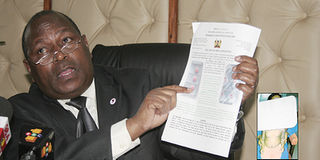Think before you pop that herbal pill

Medical services director Francis Kimani addresses the Press on herbal contraceptives on Tuesday, while inset, a toddler with enlarged breasts, a side effect of the pills. Photos/FAITH NJUGUNA
What you need to know:
- Kenyans warned that so called natural products laced with harmful chemicals
They are touted as natural herbal products with no side effects. But it is now official: they are harmful to your health.
On Tuesday, the Director of Medical Services tabled the first hard evidence by a government official confirming the damage the “herbal” products in the local market are capable of doing to those who use them and their offspring.
And Dr Francis Kimani said fun-loving men and health conscious women were at greatest risk of using the products being aggressively marketed to Kenyans.
At a press conference in his office, Dr Kimani said six women and seven children had been treated at local hospitals, including Kenyatta National Hospital with severe side effects from herbal contraceptives from China.
According to Dr Jayesh Pandit, head of drug surveillance at the Kenya Pharmacy and Poisons Board, the tablets, which are labelled in Chinese, were tested and found to have high levels of the hormones levonorgestrel and quinestrol, the active ingredients in conventional contraceptive pills.
“While the presence of these hormones proves this is not a herbal product, the active ingredients were found to be about 40 times over the safe limits,” said Dr Kimani.
The director refused to disclose the affected cases while medical personnel at KNH initially indicated that there were no such patients at the hospital.
A KNH doctor later told the Nation they had several such cases, but was not willing to comment further because investigations were still going on to determine whether the children’s condition was really a side effect of the herbal contraceptive.
Impaired speech
Complaints from the mothers affected by the herbal contraceptives, included a feeling of being pregnant and pain in the feet.
“For children born of mothers who have been using the products, they are presenting with early breast and uterus enlargement, swellings in legs, muscular pains and impaired speech,” said Dr Kimani.
Dr Wachira Murage, a gynaecologist at the hospital, said he had attended to women who were on the herbal contraceptives.
“Out of the patients who are on this pill, half of them end up getting pregnant,” he said.
The product, whose local distributors Dr Kimani refused to reveal, is not registered by the Pharmacy and Poisons Board but by the Ministry of Culture. The same happens with all other medical products claiming to be herbal compositions.
Herbalists have resisted moves to have their products registered with the board.
The medical director also told Kenyans to ignore people claiming to offer blood-cleaning services or detoxification, saying there is no evidence that they are effective.
“The only thing known to clean blood in a human body are the kidneys and in case of their failure one should visit a professional doctor,” cautioned Dr Kimani.
This is not the first time the safety of herbal products arising from contamination with conventional medicines has been reported in Kenya.
In February a local pharmacologist, Dr Lumbi M’nabea of Healthlink Ltd in Nairobi, warned that some of the heavily advertised sex enhancing herbal products could be laced with conventional pharmaceutical ingredients.
Reports by Gatonye Gathura, Maureeen Onyango and Cynthia Vukets




